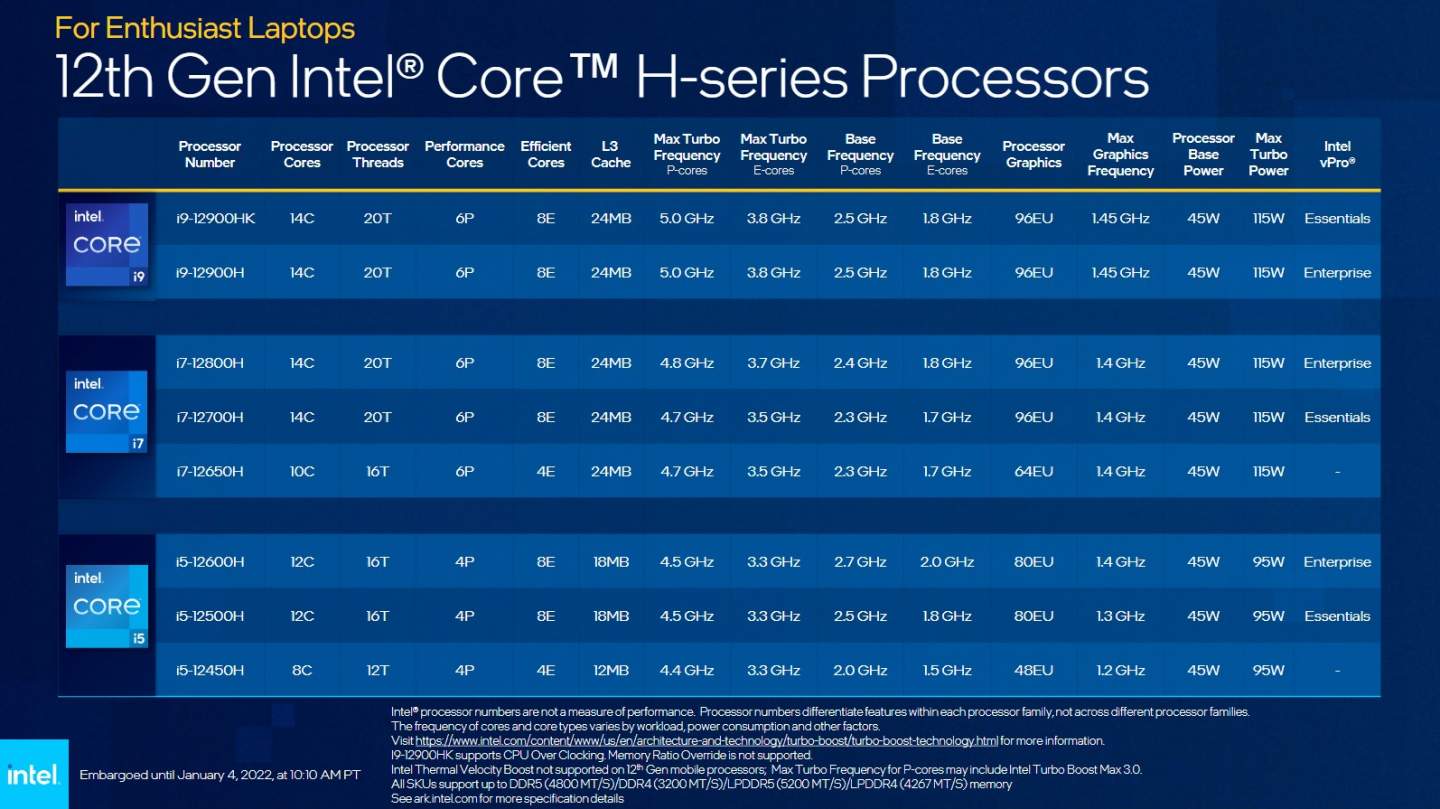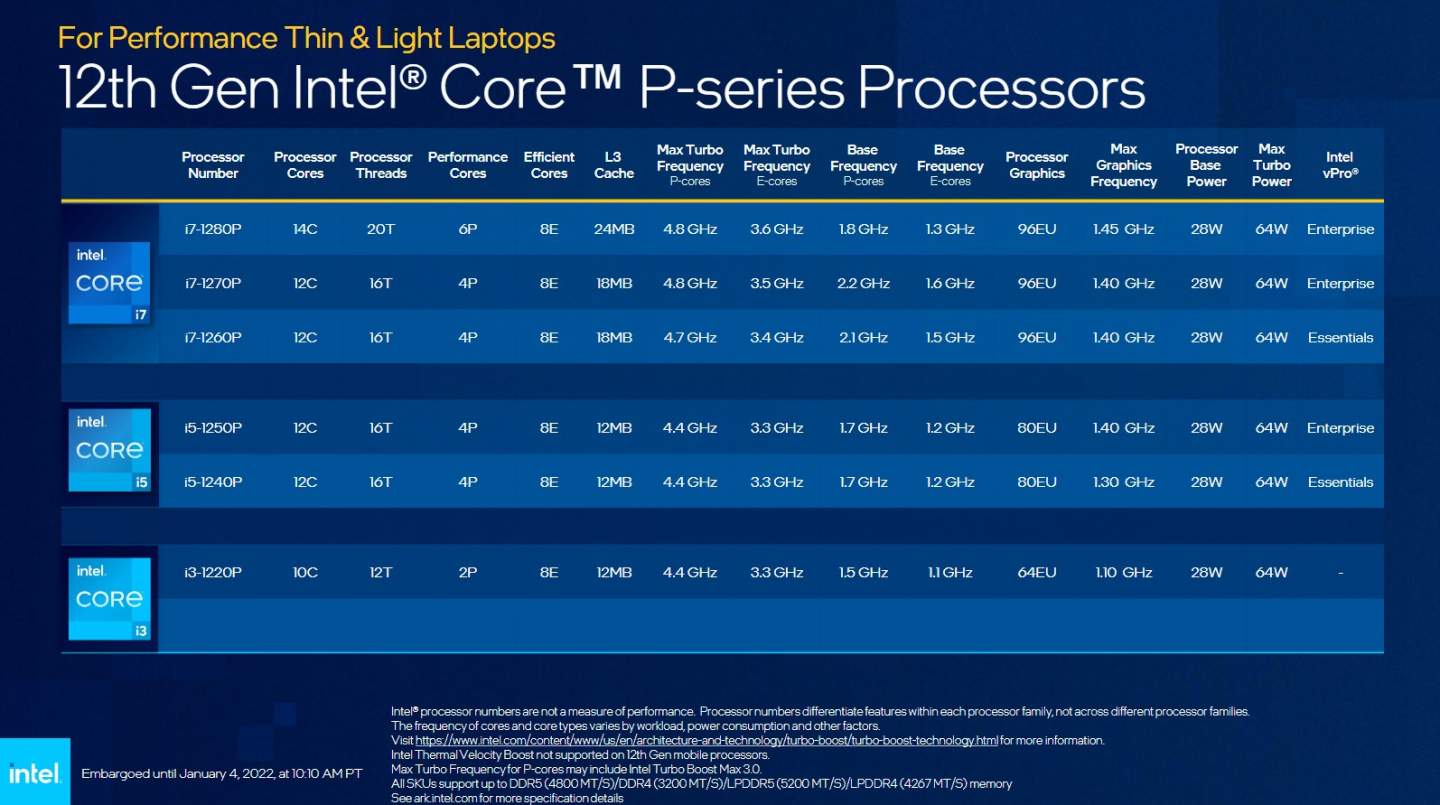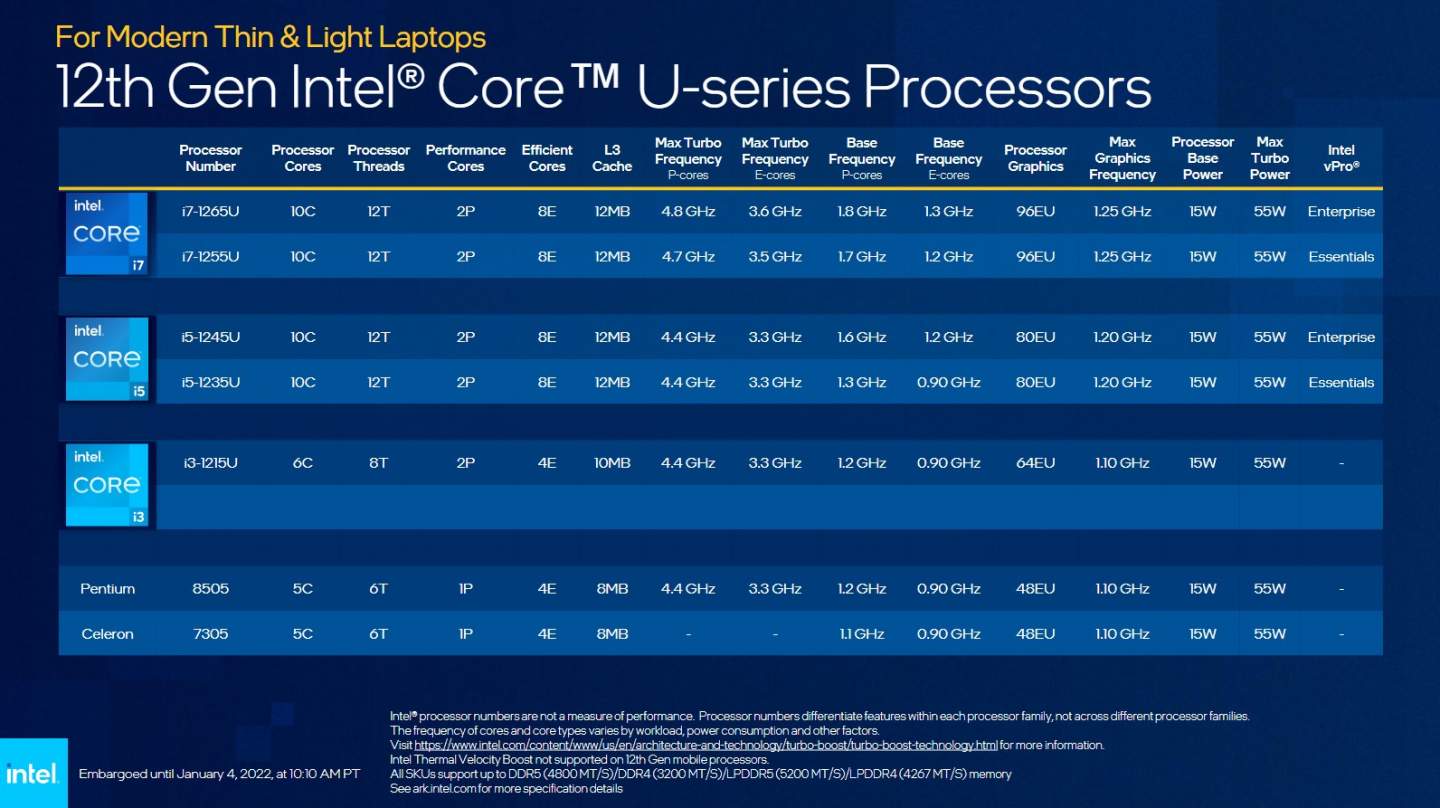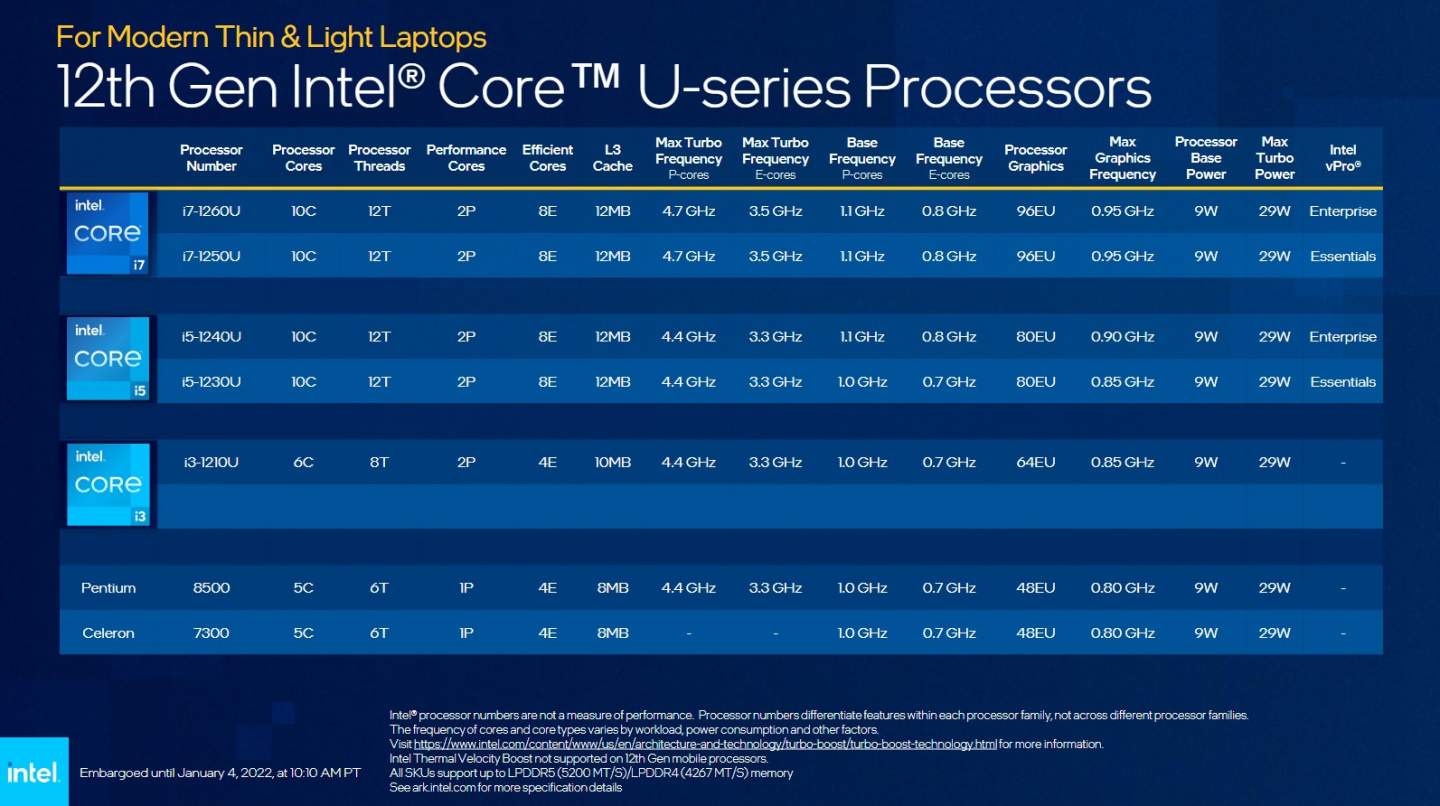Intel Reveals 12th-Gen Laptop CPUs Alongside New Desktop Chips And Evo Specs
As expected, today at CES Intel revealed its 12th-generation mobile CPUs for laptops. Today's announcement follows a year after the reveal of the company's 12th-gen desktop CPUs, which happened at CES 2021. The lineup of desktop CPUs is getting some new additions today as well, but the primary focus is on the Core i9-12900HK, the flagship CPU for Intel's new laptop lineup.
Intel 12th-gen mobile processors
Intel's 12th-gen mobile CPUs consist of three different series. The first is the U-series, which includes 9W and 15W CPUs that Intel says are for "modern thin and light" laptops – mainstream, fairly low-power machines. The second is the P-series, which offers 28W CPUs for "performance thin and light" laptops. The final series is the H-series, which includes 45W CPUs for what Intel says are enthusiast machines. Most of Intel's announcement was centered on H-series CPUs, though it did share some specifications for U-series and P-series CPUs as well.
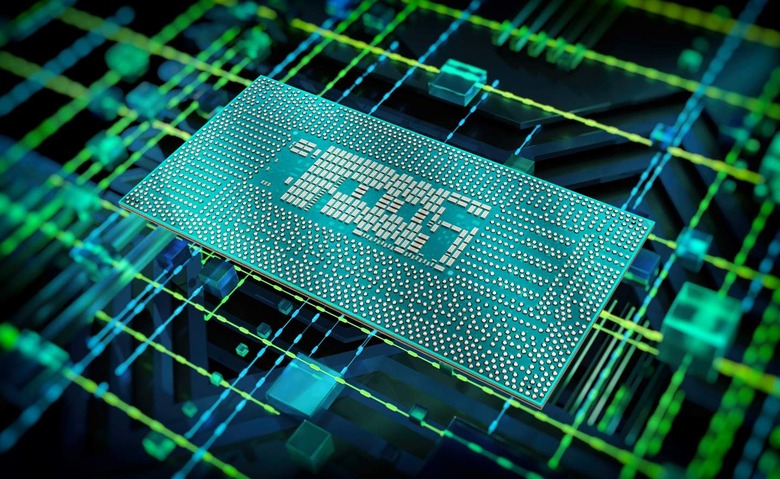
As always, the H-series is split into different tiers, starting this time with the Core i5-12450H with 8 cores (four performance, four efficiency), a base frequency of 2.0Ghz, and a Max Turbo frequency of 4.4Ghz. The other CPUs in the Core i5 lineup include the i5-12500H and the 15-12600H, which both have 12 cores (4P, 8E).
We see a similar story with the Core i7 line, which pairs the 10-core (6P, 4E) i7-12650H with the 14-core (6P, 8E) i7-12700H and i7-12800H. Interestingly enough, the i9 lineup only consists of two CPUs: the i9-12900H and the aforementioned i9-12900HK, which is the flagship CPU for the H-series. Like the two upper-end processors in the i7 family, both of these processors have 14-cores with six performance and eight efficiency cores. Both also have a base clock speed of 2.5Ghz and a Max Turbo frequency of 5GHz as well.
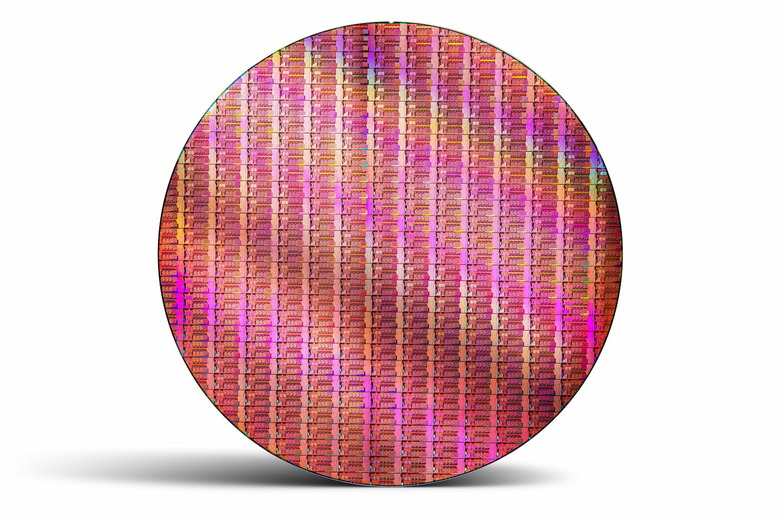
These processors are made with the "Intel 7" process, which is the rebranded name for the company's 10nm Enhanced SuperFin process. The processors in this lineup support up to DDR5-4800/LPDDR5-5200 and DDR4-3200/LPDDR4x-4267 RAM. As far as connectivity options are concerned, these processors have integrated WiFi 6E and Thunderbolt 4, with Intel saying that most laptops shipping with these CPUs will support the new WiFi standard.
Unsurprisingly, Intel says that these are the best mobile processors for gaming, claiming that the Core i9-12900HK in particular offers "up to 28% faster gameplay" compared to the previous-gen Core i9-11980HK when both processors are paired with an RTX 3080. Obviously, the graphics cards in these configurations will be doing most of the heavy lifting, though the CPU does help increase frame rates a bit. Intel's numbers show a 7% FPS increase in Forza Horizon 5, but we see more significant gains in titles like Far Cry 6 (16% more FPS) and Marvel's Guardians of the Galaxy (18% more FPS).
Intel is also positioning these CPUs as good choices for content creators. When measured with PugetBench Premiere Pro, for instance, Intel found that that the i9-12900HK offered "44% more performance" in Premiere Pro compared to the i9-11980HK. Adobe Lightroom Classic users, on the other hand, can expect around 10% more performance as measured by the PugetBench Lightroom Classic benchmark.
While these initial numbers are pretty solid, we do need to wait until machines using these processors are out in the open and some real-world testing is done on them. Intel's new mobile processors no doubt offer a performance boost over the previous-gen processors, but just how big that performance boost ends up being is dependent on a lot of factors – not just the specifications of the processors themselves. Those real-world tests should be coming around the bend soon enough, as Intel says more than 100 laptops will use 12th-gen processors, and those will start releasing in February.
New desktop processors, chipsets, and Evo guidelines
Intel also padded out its 12th-gen desktop processor line today, with 22 new CPUs ranging from Core i9s all the way down to Celeron processors. While Intel didn't describe any of these new desktop processors in-depth during its presentation, the company did say that the new batch includes 65W and 35W CPUs. With the new 65W CPUs, Intel is even shipping new stock Laminar coolers, which you can see below.
While we expect that most gamers will want to swap out the stock cooler for a more capable third-party one, stock coolers still have a place in mid-range gaming builds and more mainstream consumer machines, so it's always nice to see them get some upgrades.
Aside from the new desktop CPUs, Intel also announced the H670, H610, and B660 chipsets. While the H610 chipset won't support any PCIe 4.0 lanes, the B660 and H670 chipsets will support up to 6 and 12 PCIe 4.0 lanes, respectively. Positioned as an alternative to the Z690 chipset, these new chipsets will also support Intel Rapid Storage and Intel Volume Management Device, along with integrated WiFi 6E.
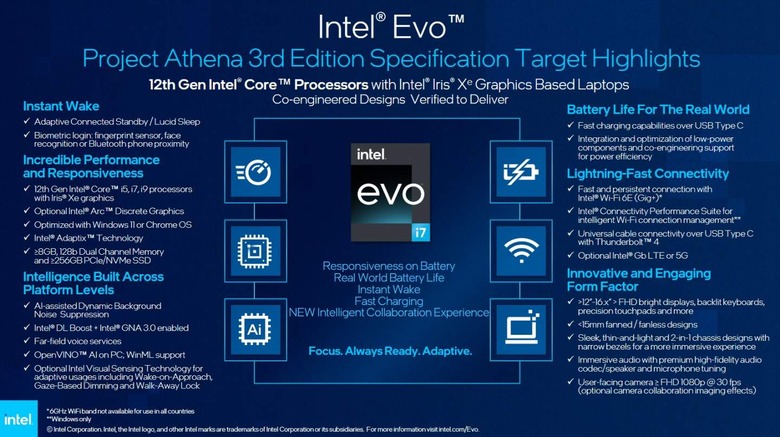
Finally, Intel today announced new guidelines for Intel Evo. These new guidelines comprise the third edition of system requirements for Evo verification. Joining existing requirements like short wake times, long battery life on FHD displays, and Thunderbolt 4 support, Intel's new requirements are themed around "intelligent collaboration."
In short, Intel will have Evo requirements include AI background noise cancellation, AI camera effects, and integrated WiFi 6E for better collaboration through video conferencing apps, which have become commonplace because of the pandemic. Intel also plans to introduce "Engineered for Intel Evo" branding for accessories so users can tell at a glance which accessories will work well with Evo-certified PCs. As for these new laptop processors, we'll see them featured in machines beginning next month, so keep an eye out for them.

